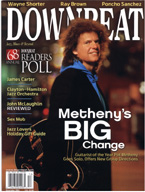
Down Beat
Players Column
December 2003
Players Column
December 2003

Implication plays a
huge role in Liberty Ellman's music. On the guitarist's sophomore CD
Tactiles (Pi Rccordings), he creates disquieting tension between groove
and swing, and between melodic symmetry and prickly angularity. He
projects a simmering effect that never allows for passive listenmg. His
burnished guitar, coalesced with Mark Shim's burly tenor and Greg
Osby's spiky alto, prowls through the rhythms laid down by drummer Eric
Harland and bassist Stephan Crump.
"I went out of my way to make sure people didn't play in a certain way," Ellman admits. "In the nehearsals, I told the band that I didn't want them to deliver their cliche versions of what they thought the grooves were going to be. If the piece requires us to play in swing, I didn't want the drummer to feel that he had to play ka-ding-ka-ding. I didn't want to hear that with this music."
Ellman contends that the music is less complicated than it sounds. "If you look at the compositions, basically everything has simple melodies," he explains. "Maybe it's the content of the lines that makes it a little bit more quirky. The goal was to make the music more direct than the other stuff that I was into."
Indeed, Tactiles is not melodically deficient. Thene are moments of shimmering melodicism, especially on the wistful ballads "Temporary Aid," "Body Art" and "Post Approval." But the intertwined improvisations he braids with Shim and Osby on the uptempo "Ultraviolet" and the slippery "Helios" jolt the senses.
While attending Cal State University, Ellman linked up with other sonic adventurers like saxophonist D'Armous Boone and pianist Vijay Iyer. "Vijay and I ended up being together in every other band," Ellman recalls. Through an introduction by Boone, Ellman and Iyer met Steve Coleman, who was doing a residency at Yoshi's. Iyer and Ellman ended up playing in Coleman's Mystic Society. In 1997, Ellman came out with his debut, Orthodoxy (Red Giant), which illustrated his interests in African grooves, DJ culture and modern jazz.
It's not surprising that Ellman's music sparkles with originality given the company he has kept since moving to New York, which includes Henry Threadgill, Francis Wong and Miya Masaoka. "I like the process of discovery in the life of a composer," Ellman says. 'Working with Threadgill, I've found out that he's willing to fail. We'll be rehearsing some pieces and he'll take it apart and reassemble it into different directions. And you're sitting there saying, 'Wow, I'm not sure if this is going to work.' When we go onstage, it can be absolutely exciting or so tentative, because it scrambled everybody's brain. And he loves it. I learned a lot from that—putting myself in a situation where things can go wrong." —John Murph
"I went out of my way to make sure people didn't play in a certain way," Ellman admits. "In the nehearsals, I told the band that I didn't want them to deliver their cliche versions of what they thought the grooves were going to be. If the piece requires us to play in swing, I didn't want the drummer to feel that he had to play ka-ding-ka-ding. I didn't want to hear that with this music."
Ellman contends that the music is less complicated than it sounds. "If you look at the compositions, basically everything has simple melodies," he explains. "Maybe it's the content of the lines that makes it a little bit more quirky. The goal was to make the music more direct than the other stuff that I was into."
Indeed, Tactiles is not melodically deficient. Thene are moments of shimmering melodicism, especially on the wistful ballads "Temporary Aid," "Body Art" and "Post Approval." But the intertwined improvisations he braids with Shim and Osby on the uptempo "Ultraviolet" and the slippery "Helios" jolt the senses.
While attending Cal State University, Ellman linked up with other sonic adventurers like saxophonist D'Armous Boone and pianist Vijay Iyer. "Vijay and I ended up being together in every other band," Ellman recalls. Through an introduction by Boone, Ellman and Iyer met Steve Coleman, who was doing a residency at Yoshi's. Iyer and Ellman ended up playing in Coleman's Mystic Society. In 1997, Ellman came out with his debut, Orthodoxy (Red Giant), which illustrated his interests in African grooves, DJ culture and modern jazz.
It's not surprising that Ellman's music sparkles with originality given the company he has kept since moving to New York, which includes Henry Threadgill, Francis Wong and Miya Masaoka. "I like the process of discovery in the life of a composer," Ellman says. 'Working with Threadgill, I've found out that he's willing to fail. We'll be rehearsing some pieces and he'll take it apart and reassemble it into different directions. And you're sitting there saying, 'Wow, I'm not sure if this is going to work.' When we go onstage, it can be absolutely exciting or so tentative, because it scrambled everybody's brain. And he loves it. I learned a lot from that—putting myself in a situation where things can go wrong." —John Murph